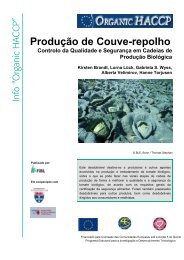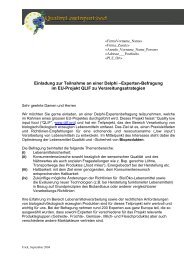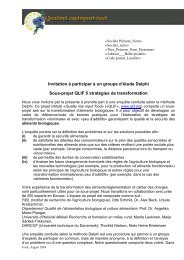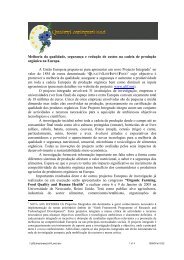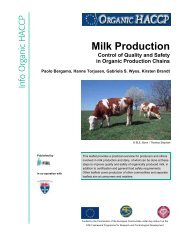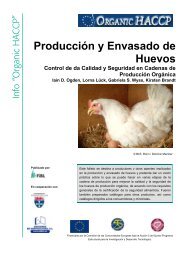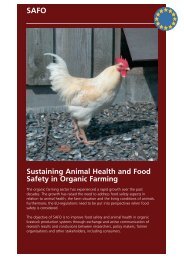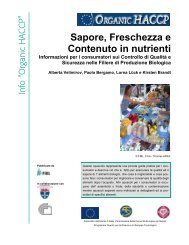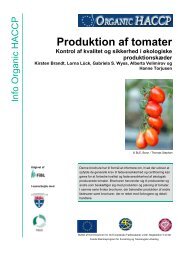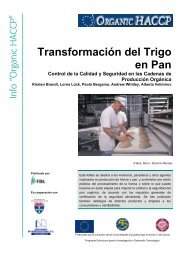ORGANIC SEED PROPAGATION: CURRENT STATUS AND ...
ORGANIC SEED PROPAGATION: CURRENT STATUS AND ...
ORGANIC SEED PROPAGATION: CURRENT STATUS AND ...
Create successful ePaper yourself
Turn your PDF publications into a flip-book with our unique Google optimized e-Paper software.
ENVIRFOOD<br />
FP6-2003-SSA-1-007003<br />
Deliverable 4<br />
cucumber, shallot, spinach, lettuce and strawberry. As for maize, more than half of the supply<br />
is unsold stock. Seed companies threaten to cut off investments in organic seed production if<br />
their supplies are not sold.<br />
Farmers are worrying about the future of old, native varieties, which are still grown all<br />
over France. They fear that the cultivation of these varieties will become restricted in the<br />
future, as they are not listed on the database. Until this is clarified, they do not support the<br />
introduction of an annex.<br />
Expert meetings were held at the beginning of November 2004. As it turned out,<br />
farmers’ support for a national annex was far from overwhelming. The government therefore<br />
proposed a more stringent derogation system instead. A list of so-called “pre-annex crops”<br />
will be drawn up. Growers submitting derogation requests for pre-annex crops will be referred<br />
back to the database. If, after that, derogation is still being requested, a farmer is to<br />
substantiate the request, and the certification body will check whether the request is fully<br />
justified. Furthermore, grounds for derogations will be kept on record, to better harmonise<br />
supply and demand. The new derogation system will be evaluated after six months. In<br />
addition, the French hope to initiate a national annex in 2006. (Source: M.Raaijmakers<br />
information from GNIS - Groupement National Interprofessionnel des Semences et Plants).<br />
In Italy derogation will be approved on condition that the variety in question is not<br />
listed in the database. The most common reason for a derogation request is lack of<br />
availability. Derogation requests have been rejected on formal grounds (e.g. failure to submit<br />
before seed purchase) or because the variety could be found on the database after all.<br />
Compared to previous years, the number of derogation requests is clearly decreased in 2004.<br />
The production of organic seed of adequate quality proves to be problematic. Farmers refuse<br />
to use specific seed supplies if practice has shown that their quality is not adequate. Not<br />
surprisingly, demand for these stocks is decreasing.<br />
Henceforth a relevant information from: On-farm seed production: integrity of<br />
organic farming system and biodiversity safeguard by Cristina Micheloni and Andrea<br />
Giubilato (AIAB- Italian Association for Organic Agriculture)<br />
An important percentage of organic farmers in Italy, especially the ones producing<br />
vegetables and fruit, sell on local markets (farm-gate selling, village/city markets, farm<br />
restaurants etc.) where local, heritage or simply “old” commercial varieties are requested and<br />
find good market opportunities. But besides the lack of certified organic seeds for heritage<br />
and local varieties or ecotypes that account for a niche market and can easily be derogated,<br />
commercial varieties too show a significant reduced availability.<br />
We consider four important crops for Italian organic production as durum wheat, common<br />
wheat, processing tomato and corn.<br />
What farmers usually claim as a derogation request are:<br />
• available varieties do not fit to their agronomic system;<br />
• available varieties do not fit to market request;<br />
• available varieties do not perform good in terms of production;<br />
• available varieties do not respect variety standards;<br />
• available varieties have not sufficient quality (germinating ability, pureness, vigour...);<br />
• sanitary status of available varieties is not adequate.<br />
A lot of derogations in 2003-2004 were requested for crop groups such as herbs, sugar<br />
beet, cereals, fodder crops, oil and fibber crops, ornamentals, vegetables, and potatoes.<br />
Among varieties requested for derogation about 25 % are produced under organic conditions,<br />
too, but not in sufficient amount. Considering other crops the situation is more difficult to<br />
evaluate because no official data are available but for fodder crops such as lucerne only 7<br />
varieties are available in organic conditions, while 38 have been requested for derogation; for<br />
15




